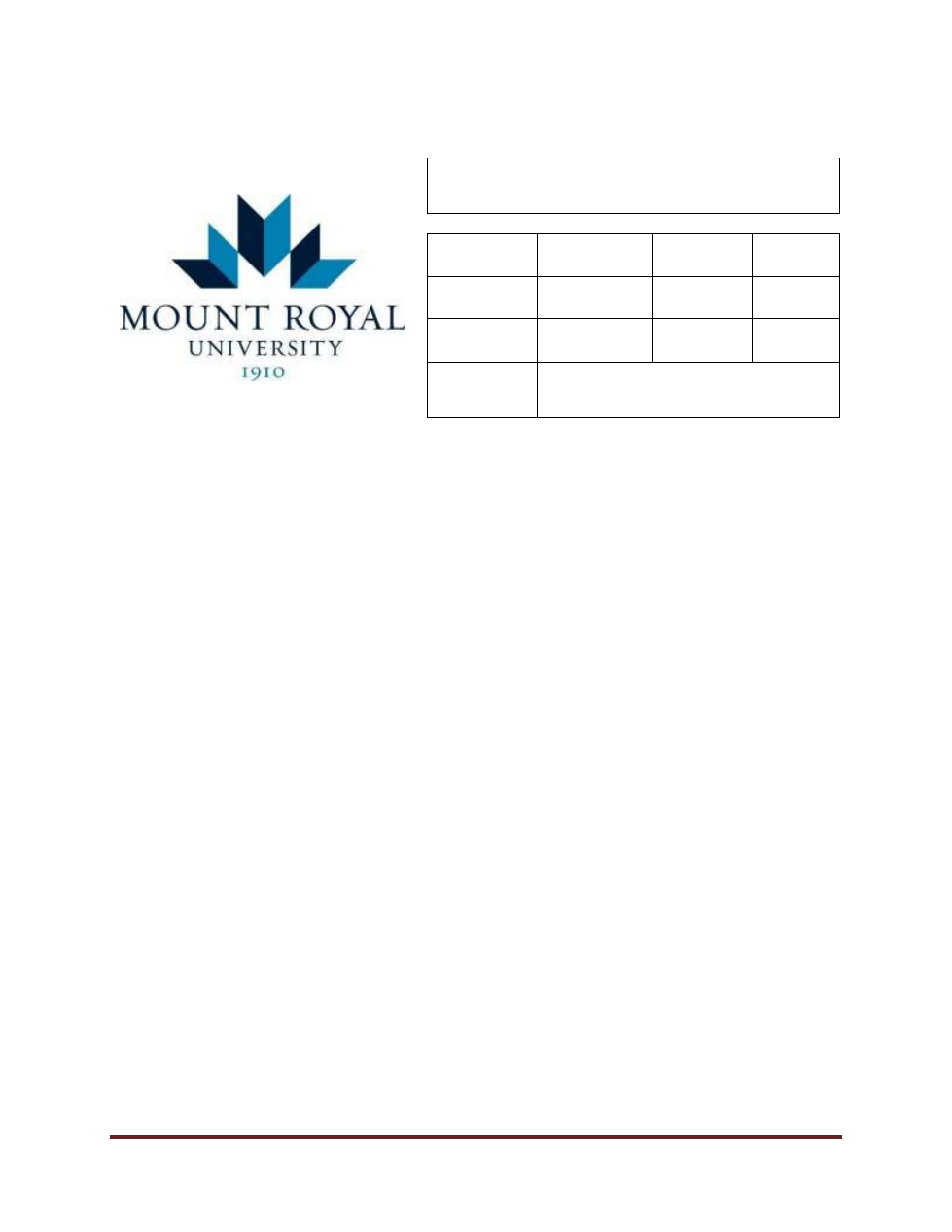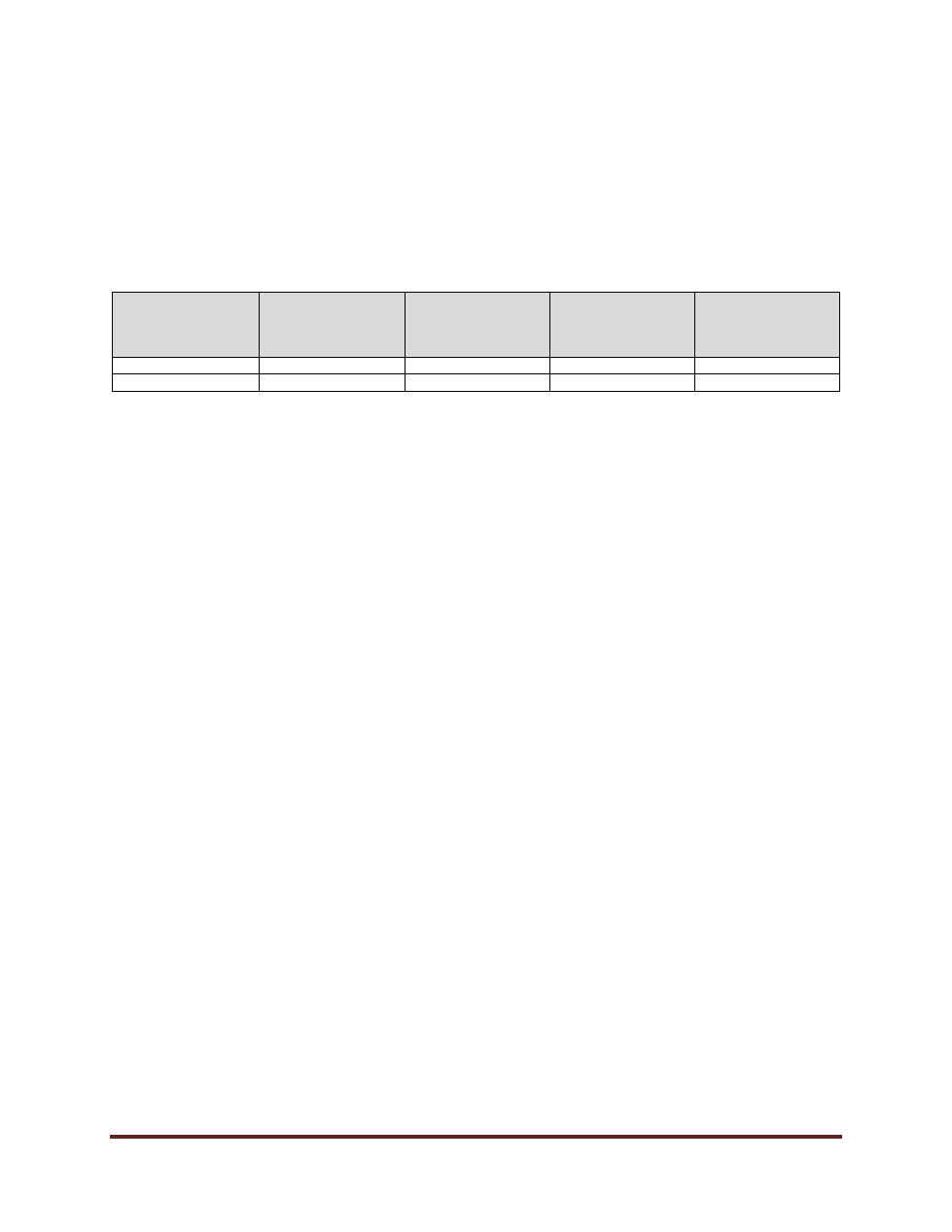
Code of Student Academic Integrity Procedures – May 20, 2022
Page 1 of 6
CODE
OF
STUDENT
ACADEMIC
INTEGRITY
-
PROCEDURES
Procedure
Type:
Academic
Initially
Approved:
May 20,
2022
Procedure
Sponsor:
Vice-President,
Students
Last Revised:
Primary
Contact:
AVP Student
Experience and
Success
Review
Scheduled:
May 20,
2027
Approver:
General Faculties Council
A.
PROCEDURES
This document outlines the procedures associated with the Code of Student Academic Integrity
(Academic Code) and provides guidance on how incidents of Academic Misconduct are reported,
investigated, and how decisions are made regarding a breach of the Academic Code.
Each academic program or area is responsible for the overall Academic Integrity of the respective
academic activities or scholarship. The Office of Student Community Standards (OSCS) is the
department responsible for the administration of the Academic Code and the associated
procedures. The OSCS can be contacted confidentially to discuss reporting options and to provide
explanations of the Academic Code and Procedures.
1.
REPORTING
1.1
Anyone can report suspected behaviours of Academic Misconduct to the instructor,
practicum supervisor, program administrator, or research associate (Faculty
Member) responsible for the Academic Activity. If unknown, a Report can be made
to the Associate Dean or Dean responsible for the Academic Activity or use the
Academic Misconduct Report Form. In most circumstances the Faculty Member or
person responsible for the Academic Activity may be the person who recognizes or
notices the suspected Academic Misconduct.
1.2
Reports about possible violations of Academic Misconduct:
a. Should be submitted in a timely manner, preferably as soon as possible after
becoming aware of the behaviour. There is not a set time limit for submitting a
Report as long as the Academic Misconduct took place when the Student was a
member of the University as per the definition of Student. It is possible to Report
suspected Academic Misconduct even after a Student has completed their
Academic Activity, credential, or graduated from the University.
b. Should include all relevant information such as; date and location of incident, the
Academic Activity involved, relevant people involved, a description of what
occurred, and any documents or materials that demonstrate the presence of
Academic Misconduct;

Code of Student Academic Integrity Procedures – May 20, 2022
Page 2 of 6
c. Any Reports that involve Academic Misconduct submitted outside of these
processes will be forwarded to the OSCS and assessed and directed as outlined
in the Academic Code;
2.
RESPONDING TO SUSPECTED INCIDENTS OF ACADEMIC MISCONDUCT
2.1
When a Faculty Member, Associate Dean, or Dean becomes aware of a suspected
act of Academic Misconduct they are responsible for the application of the Academic
Code and these procedures. The Faculty Member may consult with the Program
Chair and/or the OSCS regarding the Report, how to apply the Academic Code, and
may receive support throughout the resolution process.
2.2
All Reports involving possible violations will be reviewed by the Faculty Member to
determine whether or not the Academic Code applies. Where appropriate, the
Report may be referred to another University Official or University policy or process.
2.3
Once the Faculty Member determines that the Academic Code applies, they will
determine the Level of Academic Impact as outlined in Section 4 of the Academic
Code. The Level of Academic Impact will determine who will serve as the Reviewer
and Decision Maker. The Decision Maker, in consultation with the OSCS, may
appoint an alternative Reviewer to conduct the review.
3.
MULTIPLE PROCEEDINGS
3.1
Students may have multiple relationships with the University (e.g. student employee,
athlete, researcher, resident, work practicum) and/or their actions may intersect
more than one academic institution or University policy, code, or regulation. In such
instances, those responsible for the respective policies or regulations will jointly
determine the application of applicable policies and the appropriate processes to be
applied and in what order.
4.
REVIEWS
4.1
The Reviewer assigned will use the Report to determine the facts of what occurred
in relation to the Level of Academic Impact assigned. Reviews of suspected
Academic Misconduct will include steps such as:
a. Determining who is the Respondent(s);
b. Consulting or conferring with University Officials in the determination of
appropriate actions whenever necessary;
c. Gathering of relevant information, documents, including conducting possible
interviews to determine the facts of the case;
d. Notifying the Respondent in writing of the review of Academic Misconduct under
the Academic Code including a general description of the misconduct, the Level
of Academic Impact assigned, and an opportunity to respond to the allegations;
e. Meeting with the Respondent. The purpose of the meeting is to receive a more
detailed description of the allegation(s), and to review the process. Only following
this step, will the Respondent be asked to respond and share their account of
the Report. Should the Respondent choose not to participate in the review
process
a determination of responsibility will be completed using the information
available;

Code of Student Academic Integrity Procedures – May 20, 2022
Page 3 of 6
f. Summarizing the findings upon the completion of the review
that
will be used to
determine the appropriate resolution.
5.
DECISION MAKING AND RESOLUTIONS
5.1
The Reviewer will use the findings of fact established in the review to determine if a
violation of the Academic Code occurred. All decisions regarding a finding of
responsibility and thus a violation of the Academic Code will be made using the
standard of the balance of probabilities; whether it was more likely or not to have
taken place. When a Student is found to have violated the Academic Code, the
Decision Maker will determine the appropriate resolution to the Academic
Misconduct as outlined in Section 6 of the Academic Code. The Decision Maker will
submit the Academic Misconduct Decision to the OSCS to be processed in the
following manner:
a. Submit an
Academic Misconduct Decision Form that includes the following
information:
i.
the details of Academic Misconduct including the date of the incident
,
the suspected misconduct, and details of the Academic Activity;
ii.
the date of the meeting with the Respondent;
iii.
a summary of the Respondent’s response;
iv.
a summary of the findings of the review;
v.
the decision including the specific sections of Academic Misconduct
violated;
vi.
a list of the assigned Resolutions;
vii.
a rationale as to why the decision was made;
viii.
any relevant files and documents associated with the completion of
the review.
b. The OSCS who will assess for completeness of all requirements. If necessary,
the OSCS will contact the Decision Maker to include the missing information;
c. The OSCS will record the decision and create a Decision Letter that includes:
i.
The information outlined within 5.1(a);
ii.
Information about the appeal process as outlined within the Student
Appeals Policy and Procedures;
d. The Decision Letter will be sent to the Respondent, the Decision Maker, and if
necessary the Registrar should there be any adjustments necessary to the
Student’s academic record as a result of the Academic Misconduct.
e. The OSCS will maintain the records associated with the Academic Misconduct
decisions. In the event a student has two (2) or more Academic Misconduct
decisions, this will constitute an additional violation of Academic Misconduct
and will automatically be forwarded to the program area of study Level of
Academic Impact for review.
6.
RECORDS
6.1
All documents and records collected as a result of these Procedures will be
maintained in compliance with the University’s Records Policy and the Alberta
Freedom of Information and Protection of Privacy Act. The OSCS is responsible for
maintaining all records separate from a Student’s academic record. Where the

Code of Student Academic Integrity Procedures – May 20, 2022
Page 4 of 6
resolution requires adjustment or action on the Student’s academic record, the
Registrar will be provided the necessary information.
6.2
The OSCS will prepare an annual statistical report of all Academic Misconduct
addressed according to the Academic Code for the General Faculties Council –
Student Affairs Committee. This report shall be anonymized and ensure no
identifying information is included.
7.
REPORTING
7.1
Academic Integrity and Misconduct are complex situations that constantly evolve in
response to changes in technology, learning pedagogy, and other factors. In
recognition of this, academic leaders of the University play a pivotal role in providing
current guidance and recommendations for upholding of the Academic Integrity
standards of the University and the Academic Code. Program Chairs have a direct
responsibility for academic quality at the University. To provide guidance to the
University’s Academic Integrity standards and Academic Code process, each term
an Academic Integrity special meeting of the Chair’s Assembly will be held. This
special meeting will be to review changes in Academic Integrity scholarship, review
anonymized summaries of Academic Misconduct addressed through the Academic
Code, and provide recommendations for the education, prevention, and response to
Academic Misconduct. The special meeting will include the existing Chairs Assembly
members as well as a representative from the OSCS, a representative from the
Student Association, an Associate Dean, the Registrar, and other representatives as
deemed appropriate.
B.
DEFINITIONS
(1)
Academic Activity:
any scholarly activities of a Student conducted as part of University-
related scholarly or academic pursuits or credentials.
(2)
Academic Code:
means the Code of Student Academic Integrity.
(3)
Academic Misconduct: the actions, whether actual, attempted, or assistance provided to
another, in relation to academic and scholarly activity, whether
deliberate or inadvertent, that is dishonest, misrepresents
information, or creates unfair advantage.
(4)
Academic Integrity:
the moral and ethical practice of demonstrating fundamental values
while completing academic work, assessments or participating in
academic activities.
(5)
Appeal:
a Student’s right to challenge the decision of a Decision Maker by
asking for a review of the decision.
(6)
Decision Letter:
a written notice of the outcome of the Academic Misconduct decision
that includes the details of the misconduct, the findings of the
review, and the resolutions assigned.
(7)
Decision Maker:
means the person responsible for determining whether or not a
violation of a policy has occurred and assigns a Resolution.

Code of Student Academic Integrity Procedures – May 20, 2022
Page 5 of 6
(8)
Faculty Member:
a person responsible for an academic or scholarly activity and can
include course instructor, faculty member, practicum coordinator,
work integrated supervisor, research associate, and others.
(9)
Level of Academic
Impact:
the degree of risk posed by the suspected Academic Misconduct
and the nature of the material, the circumstances of the misconduct,
and the importance of the Academic Activity.
(10) Report:
a statement to the University seeking recourse pursuant to the
violation of this policy.
(11) Respondent:
means the individual alleged to have caused harm and violated this
policy.
(12) Reviewer:
means the individual, either internal or external to the University,
responsible for collecting the facts of a Report.
(13) Student:
means someone who has applied to a full-time, part-time, credit or
non-credit program or course offered through the University.
(14) Support Person:
an individual, unrelated to the report/incident, who can attend
meetings with a Student throughout the course of a review or appeal
to provide personal support but may not speak on their behalf.
(15) University:
means Mount Royal University.
(16) University Community: includes Students, Employees, the Board of Governors, Contractors,
Volunteers and Visitors to the University.
(17) University Official:
a person acting in the capacity as outlined by their employment at
the University.
C.
RELATED POLICIES
●
Academic Accommodation for Students Experience Disabilities Policy
●
Acceptable Use of Computing and Communication Resources Policy
●
Admissions Policy
●
Code of Conduct -Employees
●
Conflict of Interest in Research Policy
●
Email Policy
●
Expression and Free Speech Policy
●
Human Rights Policy
●
Integrity in Research and Scholarship Policy
●
Intellectual Property Policy
●
Internet and Network Access at Mount Royal University Policy
●
Matching Software Policy
●
Recording and Distribution of Academic Presentations & Materials Policy
●
Student Appeals Policy
D.
RELATED LEGISLATION
●
Alberta Freedom of Information and Protection of Privacy Act

Code of Student Academic Integrity Procedures – May 20, 2022
Page 6 of 6
●
Alberta Post Secondary Learning Act
E.
RELATED DOCUMENTS
●
Academic Integrity Report Form
●
Academic Calendar
F.
REVISION HISTORY
Date
(mm/dd/yyyy)
Description of
Change
Sections
Person who
Entered Revision
(Position Title)
Person who
Authorized
Revision
(Position Title)





